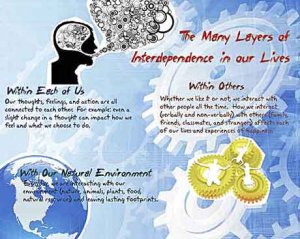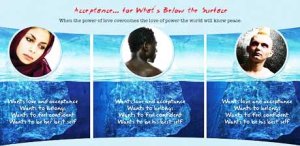Social and Emotional Curriculum: Interdependence
Door 6 of the 7 Doors to Happiness
Your content has been saved!
Go to My Saved Content.This is part six of the seven-part series from the Project Happiness curriculum. It explores the many facets of happiness and provides practical techniques to generate greater happiness and a more meaningful life -- from the inside. By reclaiming the happiness you were born with, you can influence those around you to tap into the best within themselves, too. Each door can be done alone, or the Seven Doors journey can be done in sequence. You can use this exercise to explore your own relationship to happiness, and/or bring it to your students to help them build a stronger sense of their own happiness. If you have any questions, please don't hesitate to post them in the comments section below.
DOOR SIX: INTERDEPENDENCE
"We are all connected -- what affects one, affects all in the web of life called Earth." Chief Seattle
Interdependence means mutually dependent. We depend on each other for most things: caring relationships, the world economy and even the clarity of the air we breathe. How we connect and consider one another does make a difference to our happiness -- often more than we realize.
There are several levels to being connected:
- Feeling connected in our own internal thoughts, emotions and actions
- Experiencing the interdependence in the systems within our physical body
- Being aware of interdependence in relationships with others
- Recognizing our interdependence with the Earth

1) Flow
Being in flow is when all aspects of an individual are working effortlessly together, and engagement is so deep that hours seem like minutes. This state occurs when the challenge at hand matches the skill level of that individual. (Too much challenge/too little skill produces anxiety; too little challenge/too much skill results in boredom.) When an athlete or musician is "in the zone," he or she is in a flow state and have access to inspiration, creativity and a feeling of total alignment within. There is no inner conflict. All systems and emotions are channeled and energized to be operating in sync. Catalysts include playing a sport or engaging in something creative.
Consider asking your students and yourself: when does the flow state show up for you?
2) The Body's Interdependence
Physically, it's easy to picture: inside the body there are many systems, including the circulatory system, the muscular system, the nervous system, the digestive system and so on. Each one depends on the others. If one breaks down, the whole body is affected. To be healthy and strong, we need all the systems working together. Something as simple as deep breathing can move the body closer to equilibrium. It's a great way to calm down, tune in and recalibrate. Worth a shot?
3) Relationship Interdependence
Just as all we need all systems working together for the body to be healthy and energized, in civil society we need all the various groups to work together so that everyone can thrive. Emotions are contagious. Whether we realize it or not, we all are affected by one another. Anger begets anger, and one kind act encourages another. Though the media focus is often on what separates one from the "other," we all share the same needs: to be seen, to be safe, to be loved and to belong.

When we develop an awareness of and respect for others who are different than ourselves, then empathy has a foothold. In the wake of an escalating bullying situation, you might consider asking students:
- What assumptions do you or your family make about people you don't know well? Give an example or two.
- Is it considered cool to be tough? Why or why not?
- What would it take for you to know that you have the power to make any situation better or worse, just in how you respond?
- How do your thoughts about people come out as words or actions and influence those around you, from family members to friends?
- In the case of bullying, what if all of the onlookers took the responsibility to put an end to the bullying behavior, rather than just looking the other way?
- What if it became uncool to be a bully? If it became cool to care, what would that change?
- What kind of choices are you making? How do you think they affect other people's happiness and ultimately your happiness?
4) The Earth and Interdependence
Caretaking is an indigenous philosophy and way of living that respects and cooperates with the planet. It is about living in harmony with all life, using only what we need and interacting with the Earth in ways that enhance it, not exploit it. The idea is that we do not own the Earth, but rather we are its caretakers. Depending on the situation, we travel the spectrum between consumers focused on short-term gain and caretakers with the longer-term in mind.
Here are some questions to spark new awareness:
- What makes you happy about the environment, and what would you like to change? How can you begin?
- This week, when you eat, use or buy something, pause and think of the many factors that will be impacted by your decision. What choice would have most positive impact on the world around you?
If students can look at the world they are inheriting and know that their voices matter, they will be empowered to take action. It can also spark a great discussion about personal responsibility and the kind of environment they want to create, and then lead, for the next generation to come.
Why does interdependence matter in your world, and how is it expressed? How are you dealing with bullying in your school?